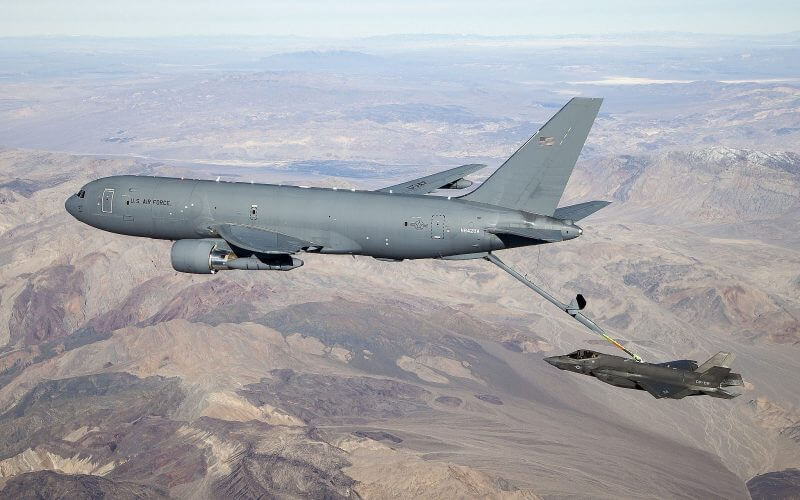While the United States under President Joe Biden and its European allies continue to negotiate with officials from Tehran over reigniting the 2015 Joint Comprehensive Plan of Action (JCPOA) to mitigate Iran’s nuclear ambitions, at the same time, the U.S. and Israeli government are considering alternatives that would halt Iran’s nuclear production and prevent the mullahs from obtaining a nuclear weapon.
One of those options include striking Iranian nuclear facilities using military fighters, generating a devastating blow to the Islamic Republic, and significantly delaying the regime’s nuclear ambitions. The latest news that the U.S. is participating in Israel’s military drill on striking Iran’s nuclear facilities demonstrates the ever more likely possibility of such military action.
According to reports, the U.S. Air Force will participate later this month with Israel’s large-scale drill simulating a strike on Iran's nuclear facilities in part of a broader operation known as Chariots of Fire. The U.S. Air force will serve as a complementary force, refueling Israeli fighter jets as they simulate entering Iranian territory and conducting repeated attacks.
Additionally, Israel’ Defense Minister Benny Gantz will soon meet with U.S. Secretary of Defense Lloyd Austin at the Pentagon in Washington to discuss U.S.-Israeli military cooperation and the issue of Iran.
The reports go on to note that Israel and the U.S. will also train for the retaliation that will come from Iran should the strike become a success. For the Jewish state, tackling a threat before it becomes a full-on menace is nothing new, given the actions by Israel to prevent Saddam Hussein in Iraq and Bashar Al-Assad in Syria from also acquiring a nuclear weapon against Israel.
In 2008, Iran’s Fardow fuel enrichment plant was discovered by U.S. and Israeli officials, which concluded that the facility was created solely for the goal of developing a nuclear weapon. American and Israeli officials realized that engaging in covert operations to sabotage Iran’s nuclear efforts had significantly failed and from the perspective of officials like then-Israeli Prime Minister Bibi Netanyahu, the world was running out of time before Iran entered what was known as the “zone of immunity.” This meant that the regime’s nuclear program would enter a phase where it was so advanced and defended, that any strike would have little or no impact.
The aerial strike would have included Israel military fighters launching from U.S. bases close to Iran, targeting several of Tehran’s important underground nuclear sites like Natanz and Fardow, using underground cluster munitions to completely devastate the area. While experts and analysts point out that this would have ended Iran’s nuclear ambitions, this would significantly have setback the regime’s nuclear production for many years, giving time for Israel and the U.S. to potentially overthrow the entire government.
As the Israeli military began preparing and training its fighters for a strike on Iranian nuclear facilities, Prime Minister Netanyahu found himself at odds with President Obama and his officials who were not in favor of such a strike and wanted to engage Iran diplomatically. The President made it clear to Netanyahu that the U.S. would not join a pre-emptive strike and decided to leak to the press Israel’s actions, prompting the prime minister to call off the action entirely. Since the United States was not prepared to help its closest and most critical ally in its time of need, the Israeli government engaged in covert operations against Iran’s nuclear program, targeting nuclear scientists and hacking into the system of underground nuclear facilities.
Under the Trump administration, Israel’s concerns on Iran’s nuclear facilities were taken seriously by the administration, which supported Prime Minister Netanyahu’s targeting assassinations of top level Iranian nuclear officials like Mohsen Fakhrizadeh. Under Secretary of State Mike Pompeo, Iran was heavily sanctioned and their top military leader, Islamic Revolutionary Guards Corps (IRGC) General Qasem Soleimani was killed to deter Iran’s growing actions in the Middle East and put the regime on notice. The Trump administration also sponsored several peace agreements in the Abraham Accords between Israel, Morocco, Bahrain, and the United Arab Emirates (UAE), creating a new anti-Iranian coalition to deter the Islamic Republic and its terrorist proxies in the region.
With the Biden administration now in power, and Naftali Bennett as Israel’s newest Prime Minister, the issue of Iran has been something the two allies have not been able to agree on once again.
According to James Philips, a senior research fellow for Middle Eastern affairs at the Heritage Foundation, “the Biden Administration is focused on closing on another nuclear deal with Iran’s dictatorship and does not want to rock the boat. As a result, it has downplayed the terrorist attacks, human rights violations, and repressive brutality of its negotiating partner in Tehran.”
Philips, like many other experts, explain that Congress can “fill the vacuum by exposing the crimes of Iran’s regime in public hearings, criticizing the Biden Administration’s weak leadership on Iranian issues and voting to pass new legislation requiring the administration to impose more sanctions on the regime for its domestic repression and other human rights violations.”
Prime Minister Gantz, like Prime Minister Netanyahu, has signaled to the Biden administration that Israel does not support the Iranian nuclear agreement and that the country will do everything in its power to defend itself from Iran even if it means striking the nuclear facilities.
The Israeli government under Prime Minister Bennett has ordered the Israeli military to prepare for an attack on Iranian nuclear sites, calling on the Knesset to increase the country’s military budget and ordering the Defense Ministry to engage in combat simulations for such an attack.
While the Biden administration has vowed to review the 2015 nuclear agreement at any cost or concession towards Iran, officials have been frustrated that Iran has refused to accept the agreement and its terms, given all the benefits the U.S. is offering. One of the main reasons why this has been the case has to do with the regime’s growing anti-American sentiments ever since the Trump administration decided to confront the mullahs and enact a maximum pressure campaign that put them on notice.
With Iran now demanding that the IRGC be removed from the U.S. Foreign Terrorist Organization (FTO) List and for members of the previous administration to be punished, the recent reports that the U.S. military refuelers and Israeli jets are cooperating for a simulation against Iran highlights the Biden Administration’s backup plan should the nuclear agreement not go through.










